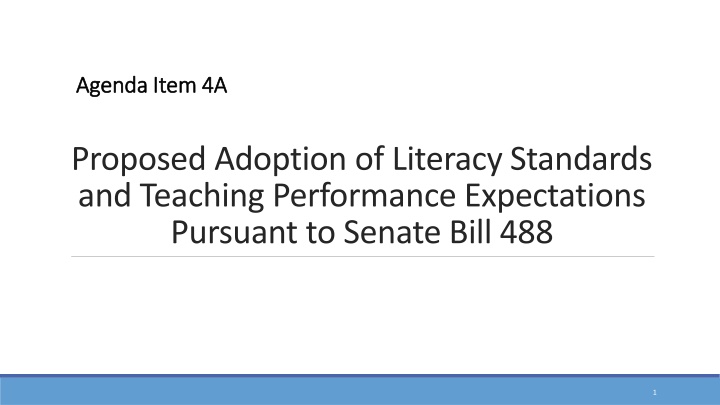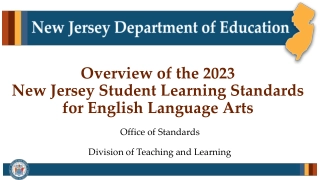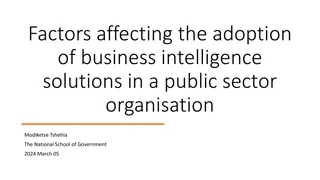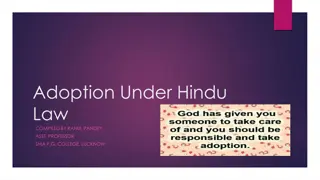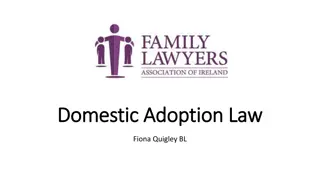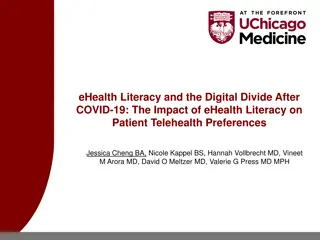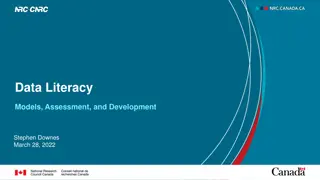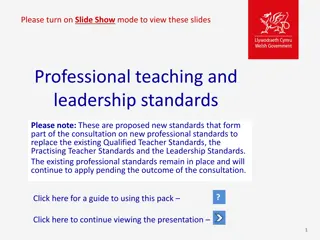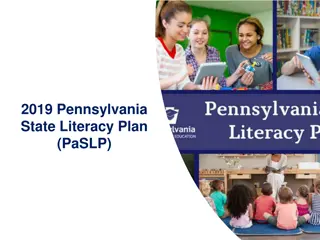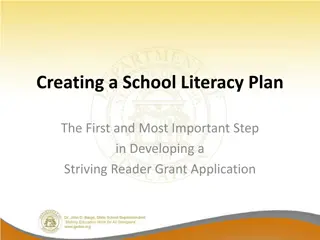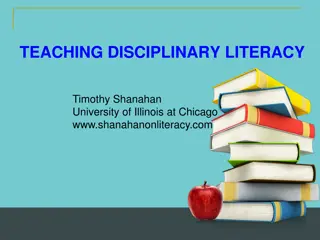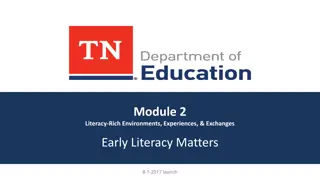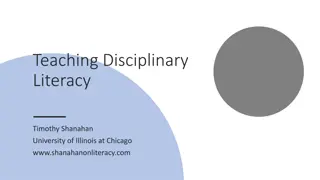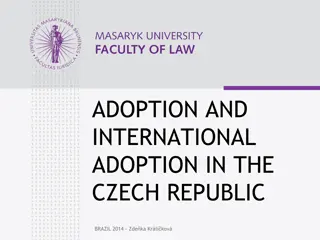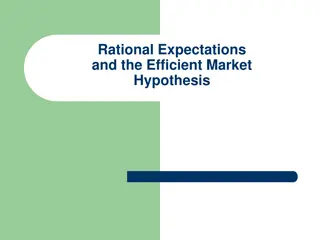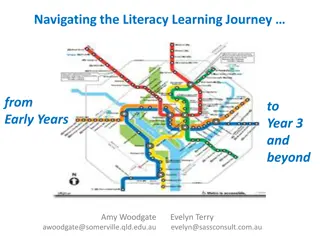Proposed Adoption of Literacy Standards and Teaching Performance Expectations
Senate Bill 488 requires the update of program standards and teaching expectations for literacy instruction, incorporating dyslexia guidelines. The SB 488 workgroup and field review surveys aim to gather feedback for alignment with state frameworks. Frequent comments stress the importance of structured literacy and addressing dyslexia in coursework and practice.
Download Presentation

Please find below an Image/Link to download the presentation.
The content on the website is provided AS IS for your information and personal use only. It may not be sold, licensed, or shared on other websites without obtaining consent from the author.If you encounter any issues during the download, it is possible that the publisher has removed the file from their server.
You are allowed to download the files provided on this website for personal or commercial use, subject to the condition that they are used lawfully. All files are the property of their respective owners.
The content on the website is provided AS IS for your information and personal use only. It may not be sold, licensed, or shared on other websites without obtaining consent from the author.
E N D
Presentation Transcript
Agenda Item 4A Agenda Item 4A Proposed Adoption of Literacy Standards and Teaching Performance Expectations Pursuant to Senate Bill 488 1
Senate Bill 488 Overview Senate Bill 488 Overview Requires the Commission to complete a series of actions related to literacy instruction Update Program Standards and Teaching Performance Expectations (TPEs) to ensure alignment with the current State Board of Education (SBE) adopted English Language Arts/English Language Development Framework and to incorporate the California Dyslexia Guidelines Develop and implement a literacy instruction performance assessment by July 1, 2025 2
SB 488 Workgroup SB 488 Workgroup Established; convened four times Objectives: For Multiple Subject, Single Subject, Proposed PK-3 ECE Specialist, and Education Specialist preliminary candidates: Make recommendations to CTC staff for additions and revisions to standards and Teaching Performance Expectations for consideration in accordance with SB 488 3
Field Review Surveys All three field review surveys closed on September 2, 2022. 178 respondents completed the survey for MS/SS 88 respondents completed the survey for Education Specialist 101 respondents completed the survey for proposed PK-3 ECE Specialist Respondents to the survey were asked to make their ratings for each question on a five-point Likert scale: Strongly Agree, Agree, Neither Agree nor Disagree, Disagree, Strongly Disagree. 4
Frequent Survey Comments Use terms structured literacy, at risk for & with dyslexia, and sound-symbol correspondences Use and rather than or in coursework or supervised clinical practice for students at risk for & with dyslexia Identify specific TPE that requires demonstration of knowledge & skills related to SB 488, including dyslexia These comments were repeated across credential types with similar or same wording. 5
Frequent Survey Comments Understand differences between students who are developing English proficiency & students with learning disabilities Ensure accurate identification of multilingual & English learner students with disabilities Provide supervised clinical practice with native and non- native speakers of English These comments were repeated across credential types with similar or same wording. 6
Other Comments Break up long sentences and long paragraphs; clarify wording Clarify differences between MS & SS requirements and between younger and older children Address disabilities beyond dyslexia (e.g., low incidence) Address inclusion, collaboration, assistive technologies 7
Low Incidence Literacy Program Standard & TPEs Meetings with Education Specialist experts were held in August & September: Early Childhood Special Education (ECSE) Deaf and Hard of Hearing (DHH) Visual Impairments (VI) Determined that each of these low incidence areas will require a unique Literacy Program Standard and unique TPEs CTC staff will continue to work with experts on the development of the standard and TPEs for these areas 8
Structure of Literacy Program Standard Introduction & Overarching Concepts Cross-cutting Themes of the ELA/ELD Framework Foundational Skills Meaning Making Language Development Effective Expression Content Knowledge Literacy Instruction for Students/ Children with Disabilities Integrated and Designated English Language Development Literacy Teaching Performance Expectations and Clinical Practice 9
Teaching Performance Expectations (TPEs) Education Specialist Extensive Support Needs 11 Universal Literacy TPE Elements 7 Unique ESN Literacy TPE Elements Domain 7: Effective Literacy Instruction for All Students Multiple Subject & Single Subject 11 Universal Literacy TPE Elements Education Specialist Mild to Moderate Support Needs 11 Universal Literacy TPE Elements 5 Unique MMSN Literacy TPE Elements Domain 7: Effective Literacy Instruction in PK-3 Settings PK-3 ECE Specialist Instruction 11 Unique Literacy TPE Elements 10
Crosswalks Crosswalks Crosswalks (Appendix A) were created to ensure that the requirements of SB 488 were addressed Multiple Subject & Single Subject Credentials Crosswalk for Literacy Program Standard Crosswalk for Literacy TPE Elements Charts comparing the elements of SB 488 with each paragraph in the standard and with each TPE element Updated after final revisions were made 11
Revisions Final drafts of the Literacy Program Standards and TPEs for three credential types presented in Appendices B, C, & D Reorganized paragraphs and simplified sentences Addressed many requests/comments related to dyslexia Addressed many requests/comments related to multilingual and English learner students 12
Revisions The following concepts were elevated or expanded in the final drafts: Universal Design for Learning Inclusion Asset-based instruction Instruction for young children Motivation Student choice Student self-assessment Digital literacy & technology Writing for various purposes & informal writing Connections across themes Collaboration among educators across disciplines Social emotional learning Trauma-informed practices Low-incidence disabilities 13
Revisions The following concepts were clarified in the final drafts: Applicability to different grades & age groups Terminology for foundational skills (e.g., fluency = accuracy, rate, prosody) Decoding & encoding in connection with beginning letter formation & fluency in handwriting & spelling Deep reading Features of language development Keyboarding Requirements for clinical practice & field experiences with diverse learners Integrated & designated ELD 14
Additional Changes in Response to Comments on Draft Standards & TPEs in Agenda Item MS/SS Page # Ed Spec Page # PK-3 ECE Page # Additional Revision or Edit Clarify integrated content & literacy instruction 33, 41, 46, 55 61, 70 Expand attention to home languages & dialects 34, 40 47, 54 62, 68 Clarify foundational skills & text reading fluency relative to spelling & syllable patterns, semantics, morphology, & syntax 35 48 63 Clarify definition of structured literacy 39 53 68 See addendum of cited pages with changes tracked. 15
Staff Recommendations for Action That the Commission adopt the proposed Literacy Program Standards and TPEs for the Preliminary Multiple Subject & Single Subject Credentials, Preliminary Education Specialist MMSN & ESN Credentials, & proposed PK-3 ECE Specialist Instruction Credential, including the addendum presented in today's meeting. That the Commission require that all Commission approved MS/SS and Education Specialist credentials transition to the new literacy standards by July 1, 2024. 16
Staff Recommendations for Action That all new PK-3 ECE Specialist credentials to be approved beginning in 2023 must demonstrate alignment to the new literacy standards and TPEs. That all new Multiple Subject, Single Subject, and Education Specialist Programs must demonstrate alignment to the new literacy standards and TPEs. That the Commission direct staff to continue the development of program standards and TPEs for the Preliminary Education Specialist ESCE, DHH, and VI Credentials. 17
Next Steps Timeframe Activity: MS/SS, Education Specialist, and proposed PK-3 Early Childhood Specialist Instruction Credentials October 13-14, 2022 October Commission Meeting Proposed adoption of draft literacy program standards and TPEs Fall 2022 Internal Commission staff training, development of technical assistance plan to assist programs Fall 2022 Continue development of program standards and TPEs for Education Specialist ECSE, DHH, and VI Winter 2022 Begin Design team work on literacy instruction performance assessment Winter 2022 Proposed adoption of program standards and TPEs for Education Specialist ECSE, DHH, and VI 2022-2024 Technical assistance to preparation programs in meeting updated literacy program standards and TPEs including but not limited to regional workshops, webinars, and office hours 18
Next Steps Timeframe Activity: MS/SS, Education Specialist, and proposed PK-3 Early Childhood Specialist Instruction Credentials 2023-2024 Board of Institutional Reviewers training update to address literacy program standards and TPEs 2023-2023 MS/SS, Education Specialist, PK-3 ECE Specialist credential Literacy Performance Assessment Pilot Study and Technical Assistance July 1, 2024 All programs are aligned to literacy program standards and TPEs 2024-2025 Review and certify preparation program compliance with new literacy program standards and TPEs 2024-2025 MS/SS, Education Specialist, PK-3 ECE Specialist credential Literacy Performance Assessment Field Test and Technical Assistance July 1, 2025 MS/SS, Education Specialist, PK-3 ECE Specialist Literacy Performance Assessment becomes operational 19
